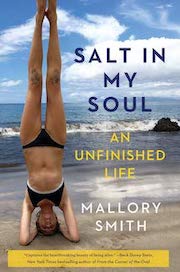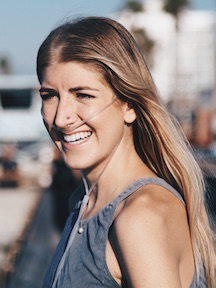By Giannina Ong
Instead of crumbling under the pressures of an insurmountable disease, Mallory Smith (ΦBK, Stanford University) utilized her diagnosis of cystic fibrosis to both advocate for those suffering like her and encourage responsible stewardship of the environment.
Mallory Smith was unlike anyone else who walked the halls of Stanford University. Not because after receiving early admission to Stanford, she spent her Christmas vacation in Cabo still contemplating completing more college applications. Nor because she was accepted to every other university she applied to. She was unusual because she was initially reluctant to go to Stanford, deeming the university “too nerdy.” Nevertheless, she graduated Phi Beta Kappa from Stanford with a major in human biology and went on to be a senior producer at Green Grid Radio. On November 15, 2017, Smith passed away at the age of 25, just two months after receiving a double-lung transplant.
Published last year, Salt In My Soul: An Unfinished Life chronicles Smith’s life and her battle with cystic fibrosis. Within the memoir, compiled from over 2,500 pages of journal entries, the reader gets to know a prolific young woman with a knack for storytelling and a love of learning.
Smith was diagnosed with cystic fibrosis at the age of three. Cystic fibrosis is an inherited disease that results from a genetic mutation that causes the protein responsible for moving chloride—a component of salt—to malfunction. The absence of chloride on the surface of cells creates a lack of water and consequently, causes a build-up of mucus for certain organs. The most affected organ are the lungs where the mucus can block airways and become home to various bacteria. What Smith’s family thought was simply a perennial cough was, in fact, her exhibiting the most common symptom of cystic fibrosis.
At the age of 12, Smith learned her lungs had been colonized by the superbug B. cenocepacia, part of the B. cepacia complex. Although the excess mucus in CF patients’ lungs can house a variety of bacteria causing respiratory infections, this bacterial strain is the deadliest resident due to its ability to develop antibiotic resistance. However, Smith writes that “as a seventh grader, esoteric medical terms and distant notions of death meant very little to me.”
That blissful naïveté would not last very long. Her mother, Diane Shader Smith, recollects a 9th grade presentation “about the mortality rates for patients with B. cepacia once you are colonized by the superbug.” Smith’s interest in her body’s internal processes followed her to college. Shader Smith notes, “She had an innate interest in her body and the science. The connection between the body and universe.”

Throughout her life, Smith spent much time outdoors in nature. Researchers confirmed what Smith found out naturally while frolicking on the beaches and in the water off the California coast. Salt water helps smooth the sticky mucus infiltrating the lungs of a person with CF. In her memoir, she shares that “salt is part and parcel of the cystic fibrosis experience. I’ve noticed the healing effects of the ocean since I was a little girl (…) I feel as if there’s salt in my soul.” The thought that lends itself to the title of the book.
Salt in My Soul is not Smith’s first publication. Her first book, The Gottlieb Native Garden: A California Love Story, is a detailed work sharing the story of the environmentalist Susan Gottlieb and the history of the Gottlieb Native Garden located only a mile away from the urban oasis of Beverly Hills. In it, Smith elaborates on the importance of native plants and ways of the ecosystem, emphasizing Gottlieb’s pursuit of restoring native plants to their full and rightful place in the ecosystem as exemplified by the Gottlieb Gardens.
Her passion for the environment combined with her heightened understanding of her disease inspired a thesis her senior year at Stanford. Smith’s storytelling ability shines through in the final product, a podcast entitled Biome. In the nearly 40 minutes of audio, she weaves a narrative comparing the bacterial colonization of her lungs to the colonization of native Hawaii by Western influences citing the endangerment of local flora and fauna including sea turtles. “I didn’t ask for illness but I own it, because if I don’t no one else will. (…) Locals and natives in Hawaii today did not ask for their islands to fall ill but they own it because if they don’t no one else will.”
Smith’s mentor for the thesis, Susan McConnell (ΦBK, Harvard Radcliff), Professor of Biology at Stanford, remarks that Smith “had an unflinching ability to look at her own disease progression in a way that made you as a reader and listener lean into the story. She was remarkably unsentimental about her own experiences. I was impressed by her ability to take her own personal situation and think so broadly about the other things she cared about, which were the environment and sustainability. Making parallels and analogies.”
At Stanford, Smith completed biology major with a concentration in environmental anthropology. In regards to Smith’s membership in Phi Beta Kappa, Shader Smith recalls that to her daughter the invite “was a huge, huge, huge surprise.” Despite 67 hospitalizations that ranged from weeks to months throughout her life, “She was not really driven by external success,” noted Shader Smith. “She said ‘Mom, it must be a pity party present to me, because my friends who are pre-med, who work so much harder than me did not get an invite.’ We looked into and found out it was not just about getting straight A’s in one subject. She had a breadth of experience and that is why she was invited. She was the most well-rounded person you could ever imagine.”
Smith’s talent for podcasting paved the way for her to become a senior producer at Green Grid Radio, where she worked on environment, energy, and sustainability radio shows and podcasts. Even now, Smith’s instinctual ability to tell stories continues to leave a legacy. Her mother is currently on tour, having been invited to speak at more than 75 prestigious venues about her daughter’s posthumous book. Moreover, a fund in her name has been set up at the Cystic Fibrosis Foundation.
Giannina Ong graduated from Santa Clara University with majors in English, classics, and women’s and gender studies and minors in history and public health sciences. An avid reader and conscientious writer, she was inducted into Phi Beta Kappa in 2018. She will begin her M.A. in Women’s and Gender Studies at University of Toronto in September. Santa Clara is home to the Pi of California chapter of Phi Beta Kappa.




